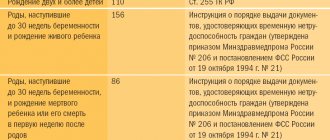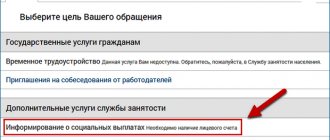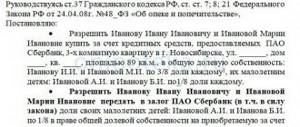Home » Housing disputes » Privatization of an apartment with a minor child
Is it possible to privatize an apartment with a minor child? How can this be done and how does the procedure differ from the classical one? These are the questions that interest many families when the need arises to register ownership of rented municipal housing. In today's article we will look at this problem in detail.
Is it possible to privatize an apartment for a minor child?
Paragraph 2 of Article 2 of Law No. 1541-1, which primarily regulates the specifics of privatization, directly states that residential premises inhabited only by children can be privatized as their property. This requires the permission of guardians or trustees (as well as government agencies involved in this matter). In addition, if the children themselves living in such premises are not aware of this possibility or do not seriously consider it, privatization may occur at the initiative of guardians/guarantors.
In addition, as part of privatization, the child’s parents can voluntarily renounce their share, so that the property will actually be registered only in the name of the child. This can be done using a notarized waiver. Until adulthood, the premises will be managed by parents, guardians or trustees, depending on which of them is available, after which the child himself will be able to manage the property directly. This does not require any additional documents.
Example : A brother and sister live in a social apartment.
Both are 15 years old. Parents died. The grandmother acts as the guardian. On her initiative, the privatization procedure is being launched. After registration of ownership rights, it will be she who will actually dispose of the apartment (within certain limits). However, after the children reach adulthood, they automatically receive the right to do whatever they want with the apartment, within the framework of current legislation.
Cases of violation of children's rights
Children are unable to fully understand the essence of adults’ actions, much less calculate their outcome and possible consequences. It is for this reason that the guardianship and trusteeship authorities monitor the observance of the rights of minors; they are the guarantor that parents or guardians will not make an erroneous decision, as a result of which the interests of the child will be violated or infringed.
The Privatization Law indicates that children registered in a municipal apartment cannot be deprived of their legal share of the property. But even this restriction does not completely protect children. You can exclude a minor from the privatization procedure by deregistering him before it begins. Government agencies try to monitor such scams and prevent them, but it is not always possible to detect malicious intent in a parent’s actions.
If it is discovered that a child’s rights have been violated and he has been deprived of his legal share in the privatized premises, it is possible to protect his interests, as a result of which he will receive the share due to him.
Deregistration
Prudent parents will never deprive their child of a share in real estate, but this is if they privatize the apartment for the purpose of further living in it. Quite often, however, privatization is only part of another planned transaction - the sale of living space. In this case, adult residents understand that the presence of a minor will not allow them to dispose of the property and sell it. It is in such situations that a child is most often deregistered. The authorities pay especially close attention to privatized housing from which a minor has been discharged within the last six months.
Deregistration may not be done intentionally. Thus, children may be discharged due to:
- Staying in special medical institutions.
- While studying at universities and colleges.
- On a business trip abroad with my parents.
Such temporary deregistrations do not deprive children of their rights to participate in privatization. Therefore, it is important to keep track of when and why the child was discharged.
Restoration of rights
A minor who was illegally deprived of a share in privatized real estate can have his rights restored.
To do this, it is important to prove the validity of the claim. If deregistration was carried out shortly before privatization and evidence is provided that this was done intentionally, you can play the situation back.
Only the court can make a decision on the illegality of the privatization. To do this, the plaintiff must collect a package of documents that will substantiate his suspicions and draw up a statement of claim. If the court finds confirmation of the fact of intentional or unintentional infringement of the child’s rights to a share in real estate, his rights will be restored. After this, privatization will not be won back, but the shares in the premises will be reviewed taking into account the interests of the minor. In addition to living space, he can also receive material compensation for infringed rights.
Rules
When privatizing with minor children, a number of rules must be taken into account:
- You cannot privatize an apartment by excluding a child from the list of owners. He cannot write a refusal and no one has the right to force him to do so. Any privatization that does not take into account the interests of the child will be considered illegal and invalid.
- Children participate in the privatization of an apartment only if they officially live in it (registered here).
- Both adults and children over the age of 14 can prepare all the required documentation.
- When privatization, permission from state guardianship authorities is required. Since this procedure is almost always in the interests of the child, there are usually no refusals.
Possibility of re-privatization
Privatization allows you to become the owner of municipal or state housing free of charge. This is an extremely tempting prospect, because purchasing real estate requires huge financial investments and not everyone can afford it. To prevent possible illegal actions, the main rule of privatization was established - one-time participation. Each person has the right to participate in the procedure and receive his share of social housing only once in his life.
Minors may participate in privatization unknowingly, based on registration on the premises. On the one hand, this protects their rights, but, on the other hand, it infringes. In order to balance the rights of everyone, a decision was made on the possibility of re-privatization for those who initially participated in it before the age of 18.
After reaching the age of majority, a citizen, despite the fact that by law he has already received his share in real estate, can apply to transfer the ownership rights of municipal housing into personal ownership. The remaining conditions must be met.
How to privatize an apartment with children
The procedure for privatizing an apartment with minor children registered in it is no different from the standard one.
Procedure
- Obtain consent to the procedure from all people living in the premises, including children aged 14 years and older.
- Prepare all necessary documents. Usually one of the residents does this, and the rest simply issue powers of attorney for him. As practice proves, it is much easier and faster than if everyone dealt with this issue separately.
- Submit an application for privatization with attached documents to the local administration or MFC (Multifunctional Center).
- Wait for a decision.
- Sign a privatization agreement (all residents are required, including minors over 14 years old).
- Register ownership in Rosreestr (everyone receives a certain share).
Procedure
Let's take a closer look at the procedure. The first and often the most difficult stage is to collect the consent of all residents. In some cases, there may be those who do not agree to privatization; in addition, some of the registered citizens may well live in another place, which is why they need to be found and negotiated. Or, if they have not appeared in the apartment for a long time and have not paid the bills, force them to evict them through the court. If someone does not want to participate in the procedure, but actually has nothing against it, he can write a notarized refusal. In this case, he loses the right to his share, but retains the possibility of privatization, which is available only once in a lifetime (for adults).
After collecting consents, you need to worry about who will be directly involved in collecting documents and filling out the application. Formally, all residents can do this together, but usually they choose the most responsible person who has time for this and issue a power of attorney for him. This person collects the necessary papers and draws up an application. Then all this is submitted together to the MFC or administration. There is not much difference, but in practice, you can get an appointment with a specialist at the MFC much faster than doing the same in the administration.
After all the documents have been submitted, all that remains is to wait for the decision of the owners, the municipality. If all the necessary papers have been collected, there are no errors in them, the residents have no debts, and there are no other factors that could lead to refusal, then consent will follow. In any case, even if privatization is refused, the refusal should be requested in writing with a clear indication of the reason. If it is adequate, you should eliminate it and try again. If not, you can go to court.
After consent is received, all residents sign a privatization agreement. If for some reason someone cannot do this, then you can also sign by proxy. The completed contract must be submitted to Rosreestr. There, on its basis, ownership of the apartment is registered, taking into account the shares of each participant in the procedure.
Documentation
The main and, perhaps, the only feature of the privatization of an apartment in which there are minor children is the need to obtain permission from the guardianship authorities. Also, if the child does not yet have a passport, his birth certificate is needed. Otherwise, the list of securities is identical to the usual privatization situation:
- Passports of all residents.
- Consents or notarized waivers.
- Power of attorney for a representative.
- Statement.
- BTI technical passport.
- Certificate stating that the residents have not previously participated in privatization.
- Statement of account confirming the absence of debt.
- Social rental agreement.
Deadlines
On average, it takes about 3-4 months from the start of the procedure until the receipt of certificates of ownership. Of these, the application will be considered for 2 months or less and the registration of ownership rights will take about 1 month. The rest of the time is spent by residents collecting the necessary documentation. The participation of minor children in the procedure has virtually no effect on the timing, since permission from the guardianship authorities is usually issued on the day of application.
Cost, expenses
Privatization is a conditionally free procedure. Free because you don't have to pay rent. Conditionally - because you need to pay a state fee and prepare some documents. Thus, when registering ownership rights, you will need to pay 200 rubles for each participant in the privatization. The remaining documents will cost about 1-2 thousand more (most of it will go to the BTI registration certificate). Another 1-2 thousand rubles will have to be paid to the notary for certification of refusals or a power of attorney. On average, if you are not in a particular hurry, fortunately privatization is now free indefinitely, then you can do it in the same 3-4 months (maximum 5) and spend from 2 to 4 thousand rubles on it.
Registration of rights
Ownership rights arise legally after state registration with Rosreestr is carried out. If minors have shares in real estate, this procedure is carried out on a general basis. It is important that before submitting documents for registration, the agreement on the transfer of rights indicates the size of the shares that are due to each participant. The law establishes clear criteria that should be followed when distributing square meters during privatization.
According to Law No. 1541-1, square meters are divided into equal shares between all privatizing parties; this is especially easy to do if two people are involved in the procedure - ½ each and the issue is resolved. If there are more participants, then the share of each is registered. Based on the information specified in the privatization agreement, state registration of rights to real estate is carried out.
To apply to Rosreestr you will need:
- Collect the documents necessary for the procedure.
- Write an application for registration.
- Pay the state fee for the operation.
Within 10 days, new owners will be entered into the national database. You can obtain confirmation of the transaction performed by ordering an extract from the Unified State Register of Real Estate.
How to privatize an apartment for a child
If you need to privatize an apartment only for a child/children, then in this case the procedure and procedures will practically not differ from those described above.
Procedure
- Obtain consent from children aged 14 years and older.
- Obtain permission from guardians/trustees.
- Obtain permission from the guardianship authorities.
- Collect the necessary documents.
- Send them along with the application to the MFC or administration.
- Get consent.
- Sign the contract.
- Register ownership.
Procedure
The procedure is identical to that described above. The only exception is obtaining permission from trustees or guardians. In some cases, the procedure itself may begin on their initiative. The remaining actions do not differ from the usual procedure. It should be noted that adult guardians are often in charge of everything, which involves issuing an appropriate power of attorney for them.
Documentation
- Permission of guardians or trustees.
- Permission from guardianship authorities.
- Birth certificates or passports of all child residents.
- BTI technical passport.
- Social tenancy agreement.
- A certificate stating that children did not participate in privatization (they have the right to 2 such procedures - once before reaching adulthood and once after it, but no more).
- An extract from the personal account confirming the absence of debt.
- Power of attorney for an adult representative.
If adults live with children and the goal is to register property rights only for children, then all other residents are required to write a refusal to participate in the procedure and have it notarized. These documents are also attached to the application.
Deadlines
The average privatization period is 3-4 months. The presence or absence of children registered in the apartment in whose name the premises are registered does not play a special role.
Price
For each child owner, the trustee/guardian will have to pay 200 rubles in state duty. They are also required to bear additional costs that may arise when certifying documents with a notary or ordering the required certificates. On average, the entire privatization will cost approximately 2-4 thousand rubles.
Who is considered a minor?
By law, all citizens whose age has not reached 18 years are considered minors, however, the Civil Code provides for the division of children into several categories according to their legal capacity:
- Young children and adolescents under 14 years of age . They are not considered legally capable, so they cannot make decisions on their own and participate in transactions. Their interests are represented by parents or guardians (Article 28 of the Civil Code);
- Teenagers over 14 years old . They already have the right to take part in transactions, but only with the approval of their parents or legal representatives (Part 1 of Article 26 of the Civil Code);
- Teenagers over 16 years of age in accordance with Art.
27 of the Civil Code, which reveals the concept of “Emancipation”, can be recognized as legally capable. This is permitted only with the consent of the parents and the guardianship authority, and in controversial cases - by court decision. A minor acquires the right to independently participate in civil transactions after marriage, from the moment of starting entrepreneurial activity or working under an employment contract.
The participation of minor children in the privatization of an apartment, no matter which of the listed categories the child belongs to, is mandatory.
Other nuances and features
Among other features, it is worth noting only two main possible problems:
- Adult residents do not agree to register the apartment only for children. This happens when several families live under one roof, in one social apartment. It is quite logical that some of the residents will refuse to lose their share simply because a completely stranger’s child supposedly needs it. It is usually impossible to reach an agreement. There is only one way out of the situation - to register the apartment for everyone according to the standard procedure as shared ownership, and then buy out the share of the adults in favor of the children.
- The guardianship authorities refuse to issue permission. This is a more complex situation, since refusals of this kind are usually justified. From the point of view of the guardianship authorities, any privatization benefits the child, as it allows him to acquire his own housing. If there is a refusal, then you must first clarify for what reason and then solve the problem based on the information received. Nothing concrete can be said here.
Example: A family wants to register an apartment for a child for some selfish purpose. In theory, the implementation of this “idea” could harm the baby. If information about this becomes known to the guardianship authorities, a refusal will follow.
Rules for registering housing without a younger family member
Sometimes parents, in order to avoid paperwork, want to carry out the real estate privatization procedure without the participation of their own child. However, instead of easing their lot, citizens find themselves an extra reason to appeal to all sorts of authorities.
If you simply sign the baby out of one room and reassign him to another, in essence, this will not change anything. For privatization, an archival certificate in Form 9 is required, which will reflect the essence of what is happening with real estate over the past 10 years . So, the child will “hang” in it, and the parents will have to take steps to return the registration to normal.
Attention! You can privatize real estate without a child only with the permission of the guardianship and trusteeship authorities. To do this, the government agency must make sure that the rights of the minor are not violated.
This is only possible under the following conditions.
- If you or your close relatives have an apartment on the right of ownership and they agree on general terms to allocate your child a share, at the same time, no less than what the child would have had during privatization.
- The other parent has another non-privatized apartment where the child is registered and he will participate in the privatization procedure there.
Failures
Refusals to privatize an apartment with minor children usually occur in the following situations:
- The interests of children are not taken into account (for example, they are not going to be included in the list of owners).
- There are errors in the documents.
- Some of the required papers are missing.
- There is no permission from the guardianship authorities.
- There is no state fee to pay.
- There is a debt on the apartment.
- The apartment is not subject to privatization (it is located in a closed city or is in disrepair).
If there are no such problems, then they should not refuse. Otherwise, you need to request a written refusal indicating the reason and file a lawsuit.
Can minor children participate in privatization?
The Federal Law of July 4, 1991 “On Privatization” clearly states that if minors are registered and permanently reside in a municipal apartment, then their participation in the procedure for turning over ownership of housing on preferential terms is mandatory. Under no circumstances can a child be deprived of his share in the purchased apartment.
Therefore, if for some reason you do not want to participate in the privatization of the child, then he must be evicted from the home. This can only be done in court; you can read more about this in this article.
Grounds for the participation of minors in privatization:
- actual residence in the apartment;
- registration (registration) in residential premises.
If these two conditions are met, then the child has the right to a share equal to the shares of the other participants in the privatization. It is impossible to reduce it or completely deprive a minor of a part of the apartment.
Arbitrage practice
As part of judicial practice, people usually face problems of refusal to privatize or violations in the framework of its implementation:
Example No. 1 : A family with a small child decided to privatize the municipal housing in which they live on the basis of a social rental agreement. After collecting all the necessary documentation, residents contact the authorities and guardianship authorities and are refused, since the house in which the housing is located is in disrepair. Since in such a situation the residents must be moved to another apartment, immediately after the move the family can try again. Consent will be more likely to be obtained.
Example No. 2 : Two families live in one apartment, one of which has a minor child. He is registered at the same address. As part of privatization, the child was mistakenly not listed anywhere, and permission was not obtained from the guardianship authorities. However, due to an error, no attention was paid to this fact and the adults were able to register ownership. A few years later the situation became clearer. Privatization was declared illegal. Now the residents will have to do everything all over again, but now they will also have to take into account a minor child.
Privatization of an apartment with a minor child is not much different from the usual procedure. However, due to the need to obtain permission from the guardianship authorities, exercising your right becomes even more difficult. Experienced lawyers will answer the most popular questions during a free consultation. In addition, they can act as representatives, which will significantly speed up and simplify the entire procedure.
FREE CONSULTATIONS are available for you! If you want to solve exactly your problem, then
:
- describe your situation to a lawyer in an online chat;
- write a question in the form below;
- call Moscow and Moscow region
- call St. Petersburg and region
Save or share the link on social networks
Author of the article
Natalya Fomicheva
Website expert lawyer. 10 years of experience. Inheritance matters. Family disputes. Housing and land law.
Ask a question Author's rating
Articles written
513
- FREE for a lawyer!
Write your question, our lawyer will prepare an answer for FREE and call you back in 5 minutes.
By submitting data you agree to the Consent to PD processing, PD Processing Policy and User Agreement
Useful information on the topic
2
How to evict your roommate from your apartment
Neither legal nor civil marriages provide guarantees of long and...
3
Is it possible to evict tenants in winter?
Renting out an empty apartment is quite a profitable business, especially...
Cancellation of apartment privatization
Abolition of privatization, also known as deprivatization or deprivatization, is...
Privatization of leased land
Privatization of a leased land plot will allow its owner to use it for any purpose...
1
Privatization of land under an apartment building
You can privatize not only a separate residential building, apartment or land...
4
How much does it cost to privatize an apartment?
Privatization of an apartment is a free procedure, but only within the cost...
The legislative framework
The term “privatization” implies the transfer to citizens of the ownership of the residential premises in which they live. At the same time, housing can initially be either municipal or state owned.
In accordance with the law “On Privatization...”, adopted in 1991, all participants in the process undertake to independently pay all necessary expenses associated with it. However, due to the fact that this act did not contain any information about the rights of minors, in 1994 it was decided to introduce some amendments to the Federal Law that would provide children with an automatic opportunity to participate in privatization.





